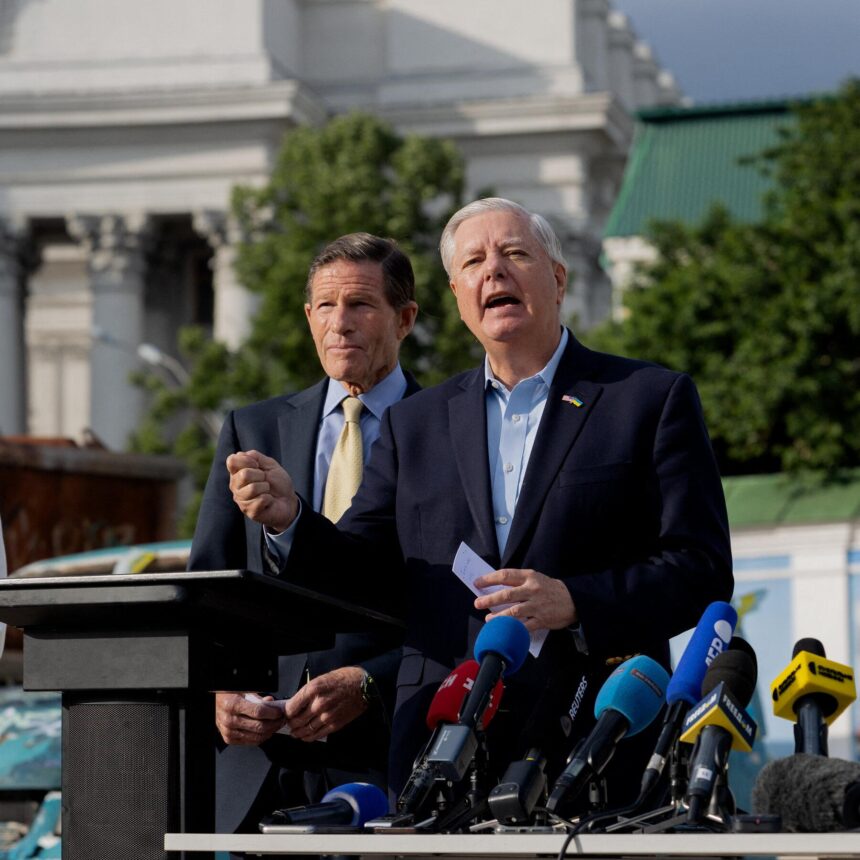Internal GOP Dynamics Influencing the Push for Stricter Russia Sanctions
As geopolitical tensions with Russia intensify, the Republican Party faces internal challenges that complicate efforts to implement harsher sanctions. A faction of GOP lawmakers is hesitant to support increased punitive measures without the explicit endorsement of former President Donald Trump, whose sway over the party’s base remains significant. This internal friction highlights the intricate balance between political allegiance and foreign policy objectives as Washington deliberates its strategy toward Moscow.
Hesitation Rooted in Trump Loyalty and Electoral Considerations
Many Republicans are cautious about advancing tougher sanctions on Russia, primarily due to concerns about alienating Trump’s devoted supporters. Without Trump’s clear approval, GOP members worry that pushing stringent measures could fracture party unity and risk losing voter support in critical regions. This reluctance has led to noticeable delays in sanction legislation, despite growing bipartisan calls for decisive action amid escalating global tensions.
Political strategists point to several key factors influencing this cautious approach:
- Potential grassroots backlash: Sanctions lacking Trump’s endorsement may provoke resistance from conservative activists.
- Factional disagreements: The party is divided between hawkish advocates and those urging a more measured response.
- Midterm election stakes: Maintaining party cohesion is seen as vital for success in pivotal battleground states.
| Influencing Factor | Possible Outcome |
|---|---|
| Trump’s Endorsement Absent | Reduced GOP solidarity, legislative delays |
| Strong Sanctions Push | Risk of alienating core supporters |
| Moderate GOP Voices | Advocate for balanced sanctions approach |
The Effect of GOP Divisions on Cross-Party Sanctions Initiatives
Efforts to strengthen sanctions against Russia are encountering significant obstacles within the Republican caucus. Many GOP members hesitate to endorse tougher measures without Trump’s explicit backing, reflecting his enduring influence over the party’s grassroots. This discord slows legislative progress and complicates the presentation of a united front, which is critical for effective foreign policy.
Consequences of these internal divisions include:
- Prolonged sanction rollouts: Bipartisan momentum stalls, allowing Russia time to adjust.
- Conflicting GOP messaging: Mixed signals weaken the perceived resolve of the U.S. internationally.
- Legislative stalemates: Political loyalty frequently enough takes precedence over cohesive policy-making.
| Republican Faction | Position on Sanctions | Level of Influence |
|---|---|---|
| Trump Loyalists | Support contingent on Trump’s approval | High |
| Moderate Republicans | Advocate for immediate, firm sanctions | Moderate |
| Isolationists | Oppose escalating sanctions | Low |
Strategies to Foster GOP Unity on Russia Sanctions Policy
To build a cohesive Republican position on sanctions against Russia, it is indeed essential to encourage open dialog that bridges the gap between traditional foreign policy hawks and Trump-aligned members. GOP leadership can play a pivotal role by organizing informal caucus meetings and bipartisan workshops, providing a safe space for airing concerns without fear of political backlash. Prioritizing shared national security goals over partisan divides can help realign the party’s focus.
Moreover, crafting targeted communications that emphasize the economic and geopolitical dangers posed by unchecked Russian aggression can definitely help unify differing factions. Key strategic approaches include:
- Reframing sanctions as essential tools for safeguarding economic security rather than partisan weapons.
- Leveraging respected GOP figures to endorse pragmatic sanctions, thereby reducing internal skepticism.
- Coordinating bipartisan messaging to demonstrate a united Republican front against foreign threats.
| Recommended Action | Anticipated Result |
|---|---|
| Host bipartisan policy forums | Enhanced trust and cooperation across party lines |
| Implement unified public messaging campaigns | Improved GOP image on national security issues |
| Engage influential GOP leaders in sanction discussions | Lowered partisan resistance among rank-and-file members |
Risks Linked to Delays in Approving Tougher Sanctions
Hesitation within the Republican caucus threatens to impede the enactment of more robust sanctions against Russia. Many GOP lawmakers are reluctant to proceed without former President Trump’s explicit support, mindful of the political consequences. This caution risks delaying critical measures that aim to increase economic pressure on Moscow amid ongoing geopolitical challenges.
Such delays not only slow legislative progress but may also undermine international cooperation. Allies anticipating decisive U.S. action could reconsider their own sanction policies or pause in solidarity, weakening the collective impact. Primary concerns include:
- Reduced deterrence: Prolonged decision-making diminishes the sanctions’ effectiveness.
- Diplomatic strain: Potential friction with European partners advocating for unified responses.
- Economic uncertainty: U.S. businesses face challenges navigating shifting sanction regulations.
| Risk | Consequence | Time Horizon |
|---|---|---|
| Legislative Deadlock | Sanctions delayed, weakening pressure on Russia | Short-term (weeks) |
| Allied Coordination Challenges | Reduced alignment with NATO and EU partners | Medium-term (months) |
| Economic Disruptions | U.S.companies face inconsistent regulatory environments | Ongoing |
Looking Ahead: The Future of GOP Sanctions Policy on Russia
As discussions over intensifying sanctions on Russia continue, GOP leaders remain cautious about advancing without former President Trump’s endorsement. This hesitancy reflects his lasting influence within the party and highlights the broader challenges lawmakers face in forging a unified approach to Russia policy. The upcoming weeks will be critical in determining whether bipartisan consensus can be achieved or if partisan divisions will stall further progress.
